Business Law Assignment: UK Legal System, Employment Law
VerifiedAdded on 2023/06/07
|6
|2611
|419
Homework Assignment
AI Summary
This Business Law assignment, completed for the BSC (Hons) Business Management with Foundation program, Semester 1, covers key aspects of the UK legal system and employment law. It addresses the structure of the legal system, differentiating between public and private law, and explores the roles of civil and criminal law. The assignment delves into the sources of law, emphasizing the importance of supreme authority and the principles of equality and maintaining order. Furthermore, it examines employment law, detailing the relationship between employers and employees, and analyzing relevant legislation like the Employment Rights Act 1996, the Equality Act 2010, the National Wages Act 1998, the Part-time Worker Act 2000, and the Data Protection Act 2018. The assignment provides a comprehensive overview of legal frameworks essential for business operations.
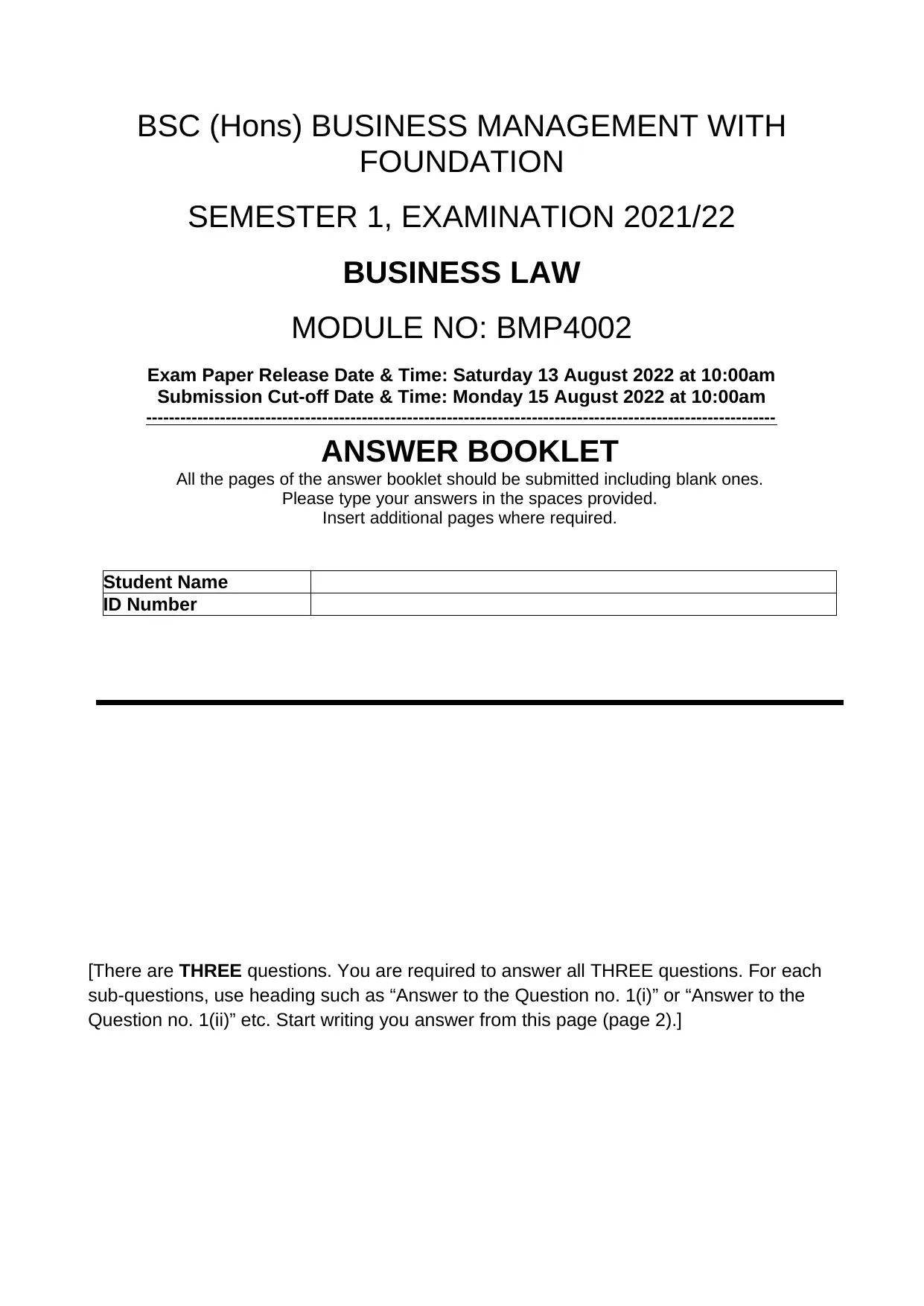
BSC (Hons) BUSINESS MANAGEMENT WITH
FOUNDATION
SEMESTER 1, EXAMINATION 2021/22
BUSINESS LAW
MODULE NO: BMP4002
Exam Paper Release Date & Time: Saturday 13 August 2022 at 10:00am
Submission Cut-off Date & Time: Monday 15 August 2022 at 10:00am
---------------------------------------------------------------------------------------------------------------
ANSWER BOOKLET
All the pages of the answer booklet should be submitted including blank ones.
Please type your answers in the spaces provided.
Insert additional pages where required.
Student Name
ID Number
[There are THREE questions. You are required to answer all THREE questions. For each
sub-questions, use heading such as “Answer to the Question no. 1(i)” or “Answer to the
Question no. 1(ii)” etc. Start writing you answer from this page (page 2).]
FOUNDATION
SEMESTER 1, EXAMINATION 2021/22
BUSINESS LAW
MODULE NO: BMP4002
Exam Paper Release Date & Time: Saturday 13 August 2022 at 10:00am
Submission Cut-off Date & Time: Monday 15 August 2022 at 10:00am
---------------------------------------------------------------------------------------------------------------
ANSWER BOOKLET
All the pages of the answer booklet should be submitted including blank ones.
Please type your answers in the spaces provided.
Insert additional pages where required.
Student Name
ID Number
[There are THREE questions. You are required to answer all THREE questions. For each
sub-questions, use heading such as “Answer to the Question no. 1(i)” or “Answer to the
Question no. 1(ii)” etc. Start writing you answer from this page (page 2).]
Paraphrase This Document
Need a fresh take? Get an instant paraphrase of this document with our AI Paraphraser
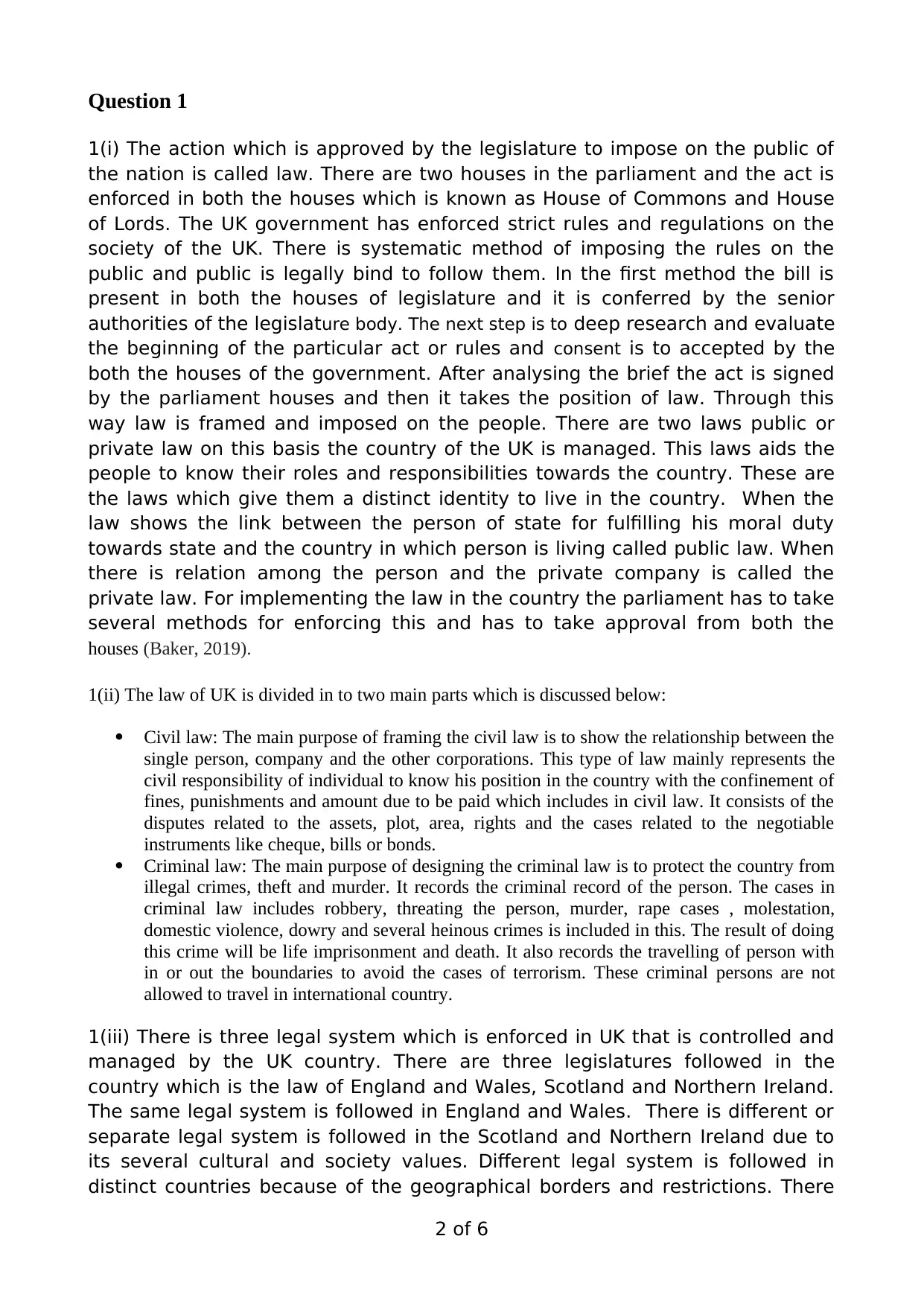
Question 1
1(i) The action which is approved by the legislature to impose on the public of
the nation is called law. There are two houses in the parliament and the act is
enforced in both the houses which is known as House of Commons and House
of Lords. The UK government has enforced strict rules and regulations on the
society of the UK. There is systematic method of imposing the rules on the
public and public is legally bind to follow them. In the first method the bill is
present in both the houses of legislature and it is conferred by the senior
authorities of the legislature body. The next step is to deep research and evaluate
the beginning of the particular act or rules and consent is to accepted by the
both the houses of the government. After analysing the brief the act is signed
by the parliament houses and then it takes the position of law. Through this
way law is framed and imposed on the people. There are two laws public or
private law on this basis the country of the UK is managed. This laws aids the
people to know their roles and responsibilities towards the country. These are
the laws which give them a distinct identity to live in the country. When the
law shows the link between the person of state for fulfilling his moral duty
towards state and the country in which person is living called public law. When
there is relation among the person and the private company is called the
private law. For implementing the law in the country the parliament has to take
several methods for enforcing this and has to take approval from both the
houses (Baker, 2019).
1(ii) The law of UK is divided in to two main parts which is discussed below:
Civil law: The main purpose of framing the civil law is to show the relationship between the
single person, company and the other corporations. This type of law mainly represents the
civil responsibility of individual to know his position in the country with the confinement of
fines, punishments and amount due to be paid which includes in civil law. It consists of the
disputes related to the assets, plot, area, rights and the cases related to the negotiable
instruments like cheque, bills or bonds.
Criminal law: The main purpose of designing the criminal law is to protect the country from
illegal crimes, theft and murder. It records the criminal record of the person. The cases in
criminal law includes robbery, threating the person, murder, rape cases , molestation,
domestic violence, dowry and several heinous crimes is included in this. The result of doing
this crime will be life imprisonment and death. It also records the travelling of person with
in or out the boundaries to avoid the cases of terrorism. These criminal persons are not
allowed to travel in international country.
1(iii) There is three legal system which is enforced in UK that is controlled and
managed by the UK country. There are three legislatures followed in the
country which is the law of England and Wales, Scotland and Northern Ireland.
The same legal system is followed in England and Wales. There is different or
separate legal system is followed in the Scotland and Northern Ireland due to
its several cultural and society values. Different legal system is followed in
distinct countries because of the geographical borders and restrictions. There
2 of 6
1(i) The action which is approved by the legislature to impose on the public of
the nation is called law. There are two houses in the parliament and the act is
enforced in both the houses which is known as House of Commons and House
of Lords. The UK government has enforced strict rules and regulations on the
society of the UK. There is systematic method of imposing the rules on the
public and public is legally bind to follow them. In the first method the bill is
present in both the houses of legislature and it is conferred by the senior
authorities of the legislature body. The next step is to deep research and evaluate
the beginning of the particular act or rules and consent is to accepted by the
both the houses of the government. After analysing the brief the act is signed
by the parliament houses and then it takes the position of law. Through this
way law is framed and imposed on the people. There are two laws public or
private law on this basis the country of the UK is managed. This laws aids the
people to know their roles and responsibilities towards the country. These are
the laws which give them a distinct identity to live in the country. When the
law shows the link between the person of state for fulfilling his moral duty
towards state and the country in which person is living called public law. When
there is relation among the person and the private company is called the
private law. For implementing the law in the country the parliament has to take
several methods for enforcing this and has to take approval from both the
houses (Baker, 2019).
1(ii) The law of UK is divided in to two main parts which is discussed below:
Civil law: The main purpose of framing the civil law is to show the relationship between the
single person, company and the other corporations. This type of law mainly represents the
civil responsibility of individual to know his position in the country with the confinement of
fines, punishments and amount due to be paid which includes in civil law. It consists of the
disputes related to the assets, plot, area, rights and the cases related to the negotiable
instruments like cheque, bills or bonds.
Criminal law: The main purpose of designing the criminal law is to protect the country from
illegal crimes, theft and murder. It records the criminal record of the person. The cases in
criminal law includes robbery, threating the person, murder, rape cases , molestation,
domestic violence, dowry and several heinous crimes is included in this. The result of doing
this crime will be life imprisonment and death. It also records the travelling of person with
in or out the boundaries to avoid the cases of terrorism. These criminal persons are not
allowed to travel in international country.
1(iii) There is three legal system which is enforced in UK that is controlled and
managed by the UK country. There are three legislatures followed in the
country which is the law of England and Wales, Scotland and Northern Ireland.
The same legal system is followed in England and Wales. There is different or
separate legal system is followed in the Scotland and Northern Ireland due to
its several cultural and society values. Different legal system is followed in
distinct countries because of the geographical borders and restrictions. There
2 of 6
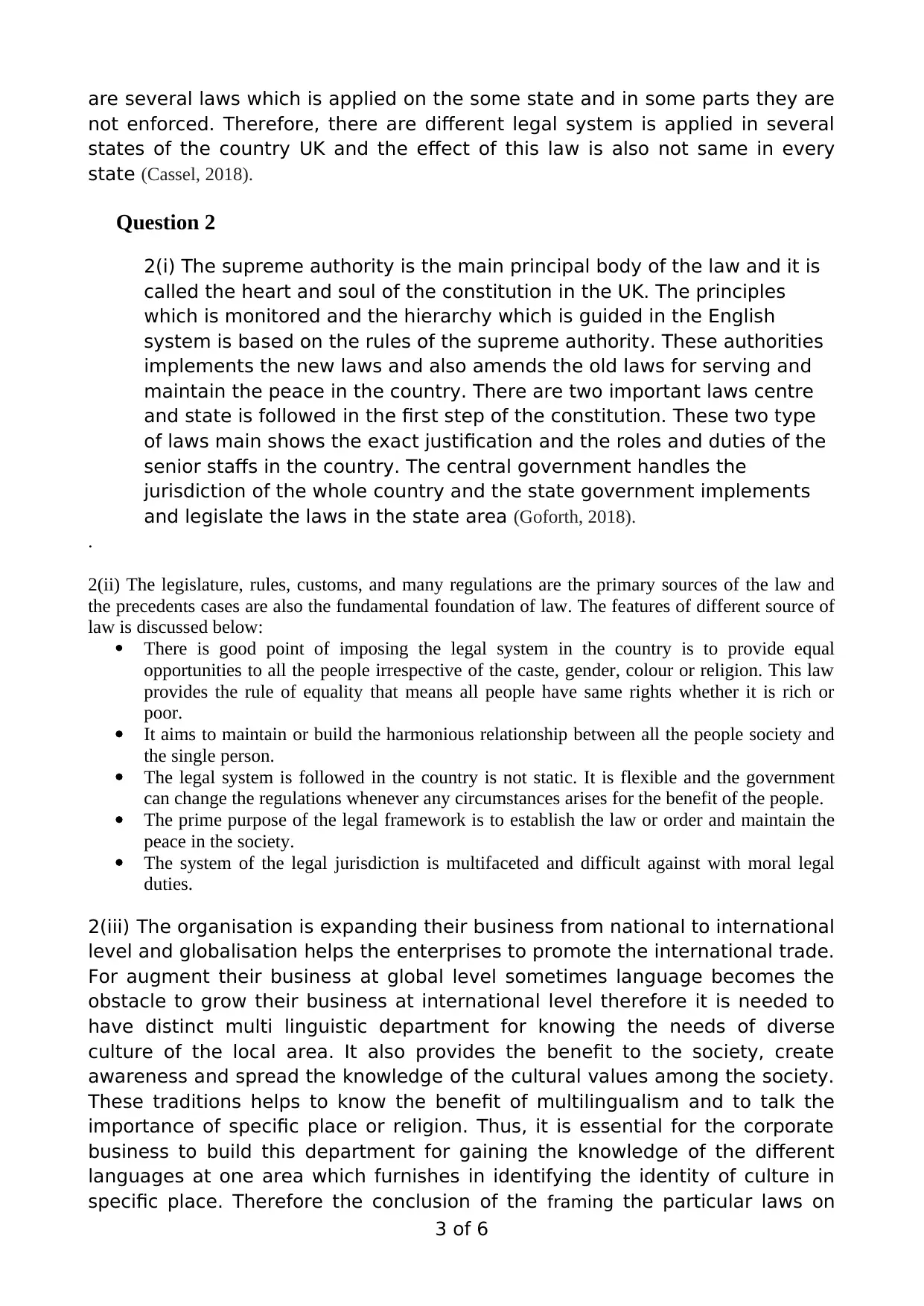
are several laws which is applied on the some state and in some parts they are
not enforced. Therefore, there are different legal system is applied in several
states of the country UK and the effect of this law is also not same in every
state (Cassel, 2018).
Question 2
2(i) The supreme authority is the main principal body of the law and it is
called the heart and soul of the constitution in the UK. The principles
which is monitored and the hierarchy which is guided in the English
system is based on the rules of the supreme authority. These authorities
implements the new laws and also amends the old laws for serving and
maintain the peace in the country. There are two important laws centre
and state is followed in the first step of the constitution. These two type
of laws main shows the exact justification and the roles and duties of the
senior staffs in the country. The central government handles the
jurisdiction of the whole country and the state government implements
and legislate the laws in the state area (Goforth, 2018).
.
2(ii) The legislature, rules, customs, and many regulations are the primary sources of the law and
the precedents cases are also the fundamental foundation of law. The features of different source of
law is discussed below:
There is good point of imposing the legal system in the country is to provide equal
opportunities to all the people irrespective of the caste, gender, colour or religion. This law
provides the rule of equality that means all people have same rights whether it is rich or
poor.
It aims to maintain or build the harmonious relationship between all the people society and
the single person.
The legal system is followed in the country is not static. It is flexible and the government
can change the regulations whenever any circumstances arises for the benefit of the people.
The prime purpose of the legal framework is to establish the law or order and maintain the
peace in the society.
The system of the legal jurisdiction is multifaceted and difficult against with moral legal
duties.
2(iii) The organisation is expanding their business from national to international
level and globalisation helps the enterprises to promote the international trade.
For augment their business at global level sometimes language becomes the
obstacle to grow their business at international level therefore it is needed to
have distinct multi linguistic department for knowing the needs of diverse
culture of the local area. It also provides the benefit to the society, create
awareness and spread the knowledge of the cultural values among the society.
These traditions helps to know the benefit of multilingualism and to talk the
importance of specific place or religion. Thus, it is essential for the corporate
business to build this department for gaining the knowledge of the different
languages at one area which furnishes in identifying the identity of culture in
specific place. Therefore the conclusion of the framing the particular laws on
3 of 6
not enforced. Therefore, there are different legal system is applied in several
states of the country UK and the effect of this law is also not same in every
state (Cassel, 2018).
Question 2
2(i) The supreme authority is the main principal body of the law and it is
called the heart and soul of the constitution in the UK. The principles
which is monitored and the hierarchy which is guided in the English
system is based on the rules of the supreme authority. These authorities
implements the new laws and also amends the old laws for serving and
maintain the peace in the country. There are two important laws centre
and state is followed in the first step of the constitution. These two type
of laws main shows the exact justification and the roles and duties of the
senior staffs in the country. The central government handles the
jurisdiction of the whole country and the state government implements
and legislate the laws in the state area (Goforth, 2018).
.
2(ii) The legislature, rules, customs, and many regulations are the primary sources of the law and
the precedents cases are also the fundamental foundation of law. The features of different source of
law is discussed below:
There is good point of imposing the legal system in the country is to provide equal
opportunities to all the people irrespective of the caste, gender, colour or religion. This law
provides the rule of equality that means all people have same rights whether it is rich or
poor.
It aims to maintain or build the harmonious relationship between all the people society and
the single person.
The legal system is followed in the country is not static. It is flexible and the government
can change the regulations whenever any circumstances arises for the benefit of the people.
The prime purpose of the legal framework is to establish the law or order and maintain the
peace in the society.
The system of the legal jurisdiction is multifaceted and difficult against with moral legal
duties.
2(iii) The organisation is expanding their business from national to international
level and globalisation helps the enterprises to promote the international trade.
For augment their business at global level sometimes language becomes the
obstacle to grow their business at international level therefore it is needed to
have distinct multi linguistic department for knowing the needs of diverse
culture of the local area. It also provides the benefit to the society, create
awareness and spread the knowledge of the cultural values among the society.
These traditions helps to know the benefit of multilingualism and to talk the
importance of specific place or religion. Thus, it is essential for the corporate
business to build this department for gaining the knowledge of the different
languages at one area which furnishes in identifying the identity of culture in
specific place. Therefore the conclusion of the framing the particular laws on
3 of 6
⊘ This is a preview!⊘
Do you want full access?
Subscribe today to unlock all pages.

Trusted by 1+ million students worldwide
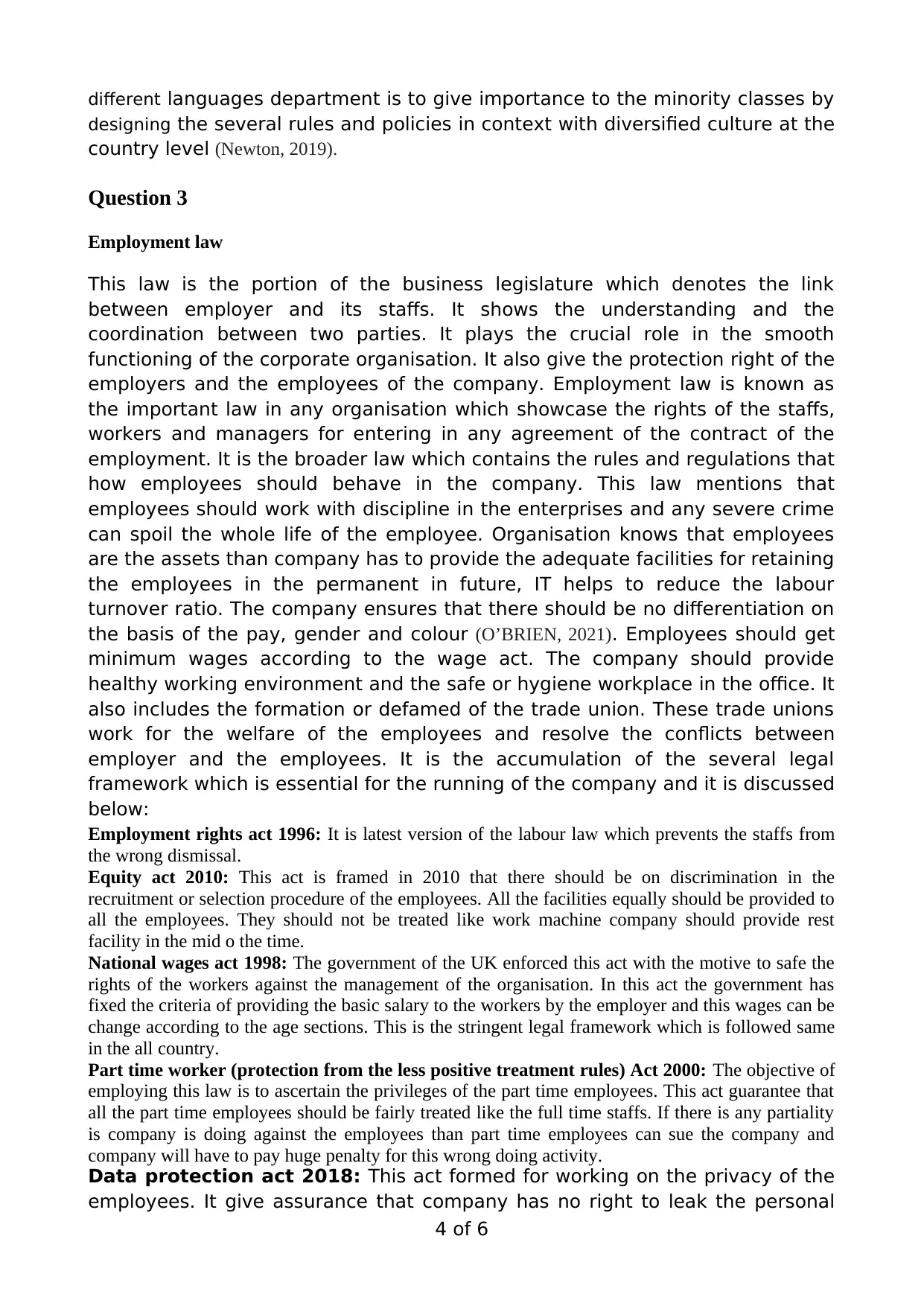
different languages department is to give importance to the minority classes by
designing the several rules and policies in context with diversified culture at the
country level (Newton, 2019).
Question 3
Employment law
This law is the portion of the business legislature which denotes the link
between employer and its staffs. It shows the understanding and the
coordination between two parties. It plays the crucial role in the smooth
functioning of the corporate organisation. It also give the protection right of the
employers and the employees of the company. Employment law is known as
the important law in any organisation which showcase the rights of the staffs,
workers and managers for entering in any agreement of the contract of the
employment. It is the broader law which contains the rules and regulations that
how employees should behave in the company. This law mentions that
employees should work with discipline in the enterprises and any severe crime
can spoil the whole life of the employee. Organisation knows that employees
are the assets than company has to provide the adequate facilities for retaining
the employees in the permanent in future, IT helps to reduce the labour
turnover ratio. The company ensures that there should be no differentiation on
the basis of the pay, gender and colour (O’BRIEN, 2021). Employees should get
minimum wages according to the wage act. The company should provide
healthy working environment and the safe or hygiene workplace in the office. It
also includes the formation or defamed of the trade union. These trade unions
work for the welfare of the employees and resolve the conflicts between
employer and the employees. It is the accumulation of the several legal
framework which is essential for the running of the company and it is discussed
below:
Employment rights act 1996: It is latest version of the labour law which prevents the staffs from
the wrong dismissal.
Equity act 2010: This act is framed in 2010 that there should be on discrimination in the
recruitment or selection procedure of the employees. All the facilities equally should be provided to
all the employees. They should not be treated like work machine company should provide rest
facility in the mid o the time.
National wages act 1998: The government of the UK enforced this act with the motive to safe the
rights of the workers against the management of the organisation. In this act the government has
fixed the criteria of providing the basic salary to the workers by the employer and this wages can be
change according to the age sections. This is the stringent legal framework which is followed same
in the all country.
Part time worker (protection from the less positive treatment rules) Act 2000: The objective of
employing this law is to ascertain the privileges of the part time employees. This act guarantee that
all the part time employees should be fairly treated like the full time staffs. If there is any partiality
is company is doing against the employees than part time employees can sue the company and
company will have to pay huge penalty for this wrong doing activity.
Data protection act 2018: This act formed for working on the privacy of the
employees. It give assurance that company has no right to leak the personal
4 of 6
designing the several rules and policies in context with diversified culture at the
country level (Newton, 2019).
Question 3
Employment law
This law is the portion of the business legislature which denotes the link
between employer and its staffs. It shows the understanding and the
coordination between two parties. It plays the crucial role in the smooth
functioning of the corporate organisation. It also give the protection right of the
employers and the employees of the company. Employment law is known as
the important law in any organisation which showcase the rights of the staffs,
workers and managers for entering in any agreement of the contract of the
employment. It is the broader law which contains the rules and regulations that
how employees should behave in the company. This law mentions that
employees should work with discipline in the enterprises and any severe crime
can spoil the whole life of the employee. Organisation knows that employees
are the assets than company has to provide the adequate facilities for retaining
the employees in the permanent in future, IT helps to reduce the labour
turnover ratio. The company ensures that there should be no differentiation on
the basis of the pay, gender and colour (O’BRIEN, 2021). Employees should get
minimum wages according to the wage act. The company should provide
healthy working environment and the safe or hygiene workplace in the office. It
also includes the formation or defamed of the trade union. These trade unions
work for the welfare of the employees and resolve the conflicts between
employer and the employees. It is the accumulation of the several legal
framework which is essential for the running of the company and it is discussed
below:
Employment rights act 1996: It is latest version of the labour law which prevents the staffs from
the wrong dismissal.
Equity act 2010: This act is framed in 2010 that there should be on discrimination in the
recruitment or selection procedure of the employees. All the facilities equally should be provided to
all the employees. They should not be treated like work machine company should provide rest
facility in the mid o the time.
National wages act 1998: The government of the UK enforced this act with the motive to safe the
rights of the workers against the management of the organisation. In this act the government has
fixed the criteria of providing the basic salary to the workers by the employer and this wages can be
change according to the age sections. This is the stringent legal framework which is followed same
in the all country.
Part time worker (protection from the less positive treatment rules) Act 2000: The objective of
employing this law is to ascertain the privileges of the part time employees. This act guarantee that
all the part time employees should be fairly treated like the full time staffs. If there is any partiality
is company is doing against the employees than part time employees can sue the company and
company will have to pay huge penalty for this wrong doing activity.
Data protection act 2018: This act formed for working on the privacy of the
employees. It give assurance that company has no right to leak the personal
4 of 6
Paraphrase This Document
Need a fresh take? Get an instant paraphrase of this document with our AI Paraphraser
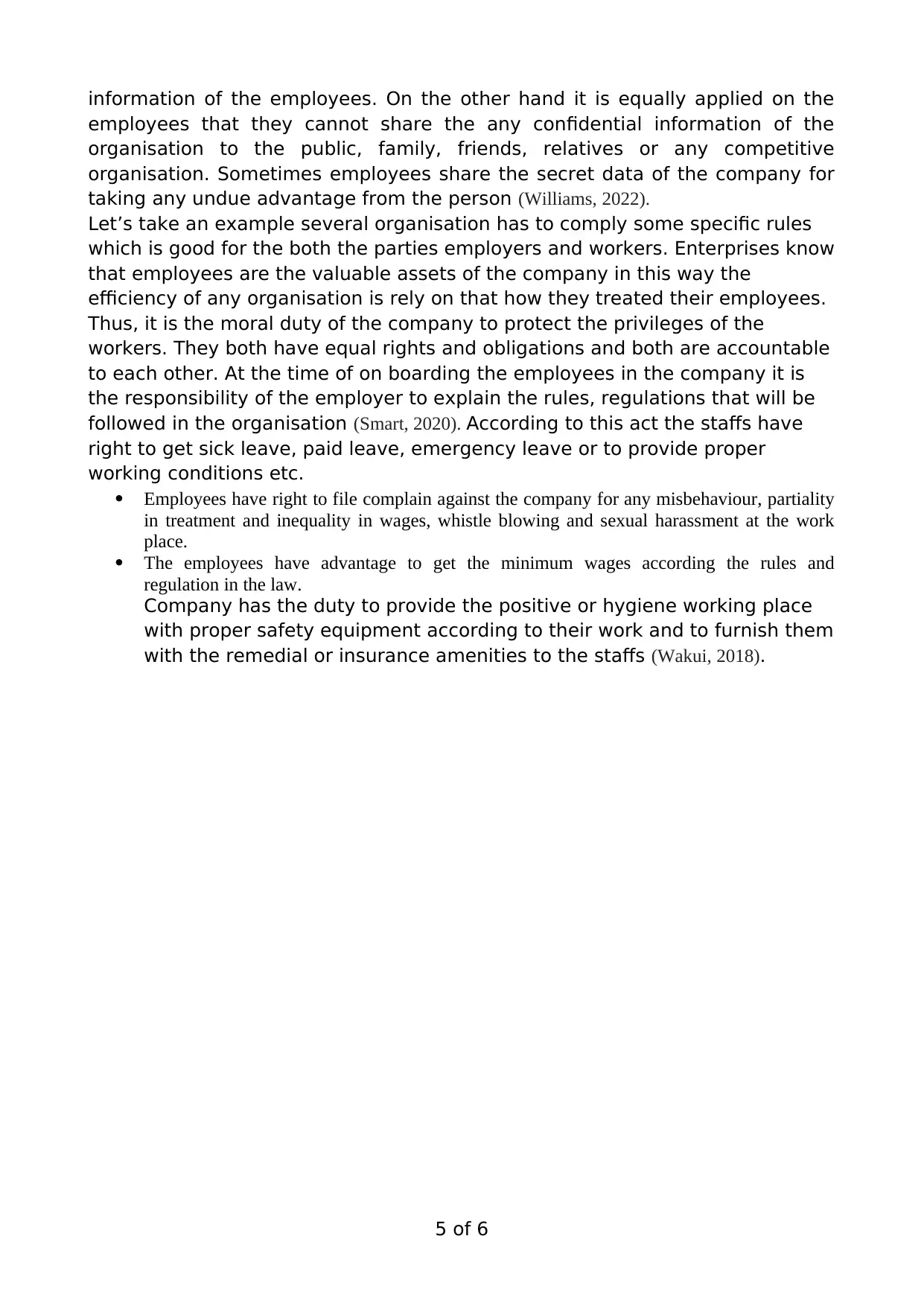
information of the employees. On the other hand it is equally applied on the
employees that they cannot share the any confidential information of the
organisation to the public, family, friends, relatives or any competitive
organisation. Sometimes employees share the secret data of the company for
taking any undue advantage from the person (Williams, 2022).
Let’s take an example several organisation has to comply some specific rules
which is good for the both the parties employers and workers. Enterprises know
that employees are the valuable assets of the company in this way the
efficiency of any organisation is rely on that how they treated their employees.
Thus, it is the moral duty of the company to protect the privileges of the
workers. They both have equal rights and obligations and both are accountable
to each other. At the time of on boarding the employees in the company it is
the responsibility of the employer to explain the rules, regulations that will be
followed in the organisation (Smart, 2020). According to this act the staffs have
right to get sick leave, paid leave, emergency leave or to provide proper
working conditions etc.
Employees have right to file complain against the company for any misbehaviour, partiality
in treatment and inequality in wages, whistle blowing and sexual harassment at the work
place.
The employees have advantage to get the minimum wages according the rules and
regulation in the law.
Company has the duty to provide the positive or hygiene working place
with proper safety equipment according to their work and to furnish them
with the remedial or insurance amenities to the staffs (Wakui, 2018).
5 of 6
employees that they cannot share the any confidential information of the
organisation to the public, family, friends, relatives or any competitive
organisation. Sometimes employees share the secret data of the company for
taking any undue advantage from the person (Williams, 2022).
Let’s take an example several organisation has to comply some specific rules
which is good for the both the parties employers and workers. Enterprises know
that employees are the valuable assets of the company in this way the
efficiency of any organisation is rely on that how they treated their employees.
Thus, it is the moral duty of the company to protect the privileges of the
workers. They both have equal rights and obligations and both are accountable
to each other. At the time of on boarding the employees in the company it is
the responsibility of the employer to explain the rules, regulations that will be
followed in the organisation (Smart, 2020). According to this act the staffs have
right to get sick leave, paid leave, emergency leave or to provide proper
working conditions etc.
Employees have right to file complain against the company for any misbehaviour, partiality
in treatment and inequality in wages, whistle blowing and sexual harassment at the work
place.
The employees have advantage to get the minimum wages according the rules and
regulation in the law.
Company has the duty to provide the positive or hygiene working place
with proper safety equipment according to their work and to furnish them
with the remedial or insurance amenities to the staffs (Wakui, 2018).
5 of 6
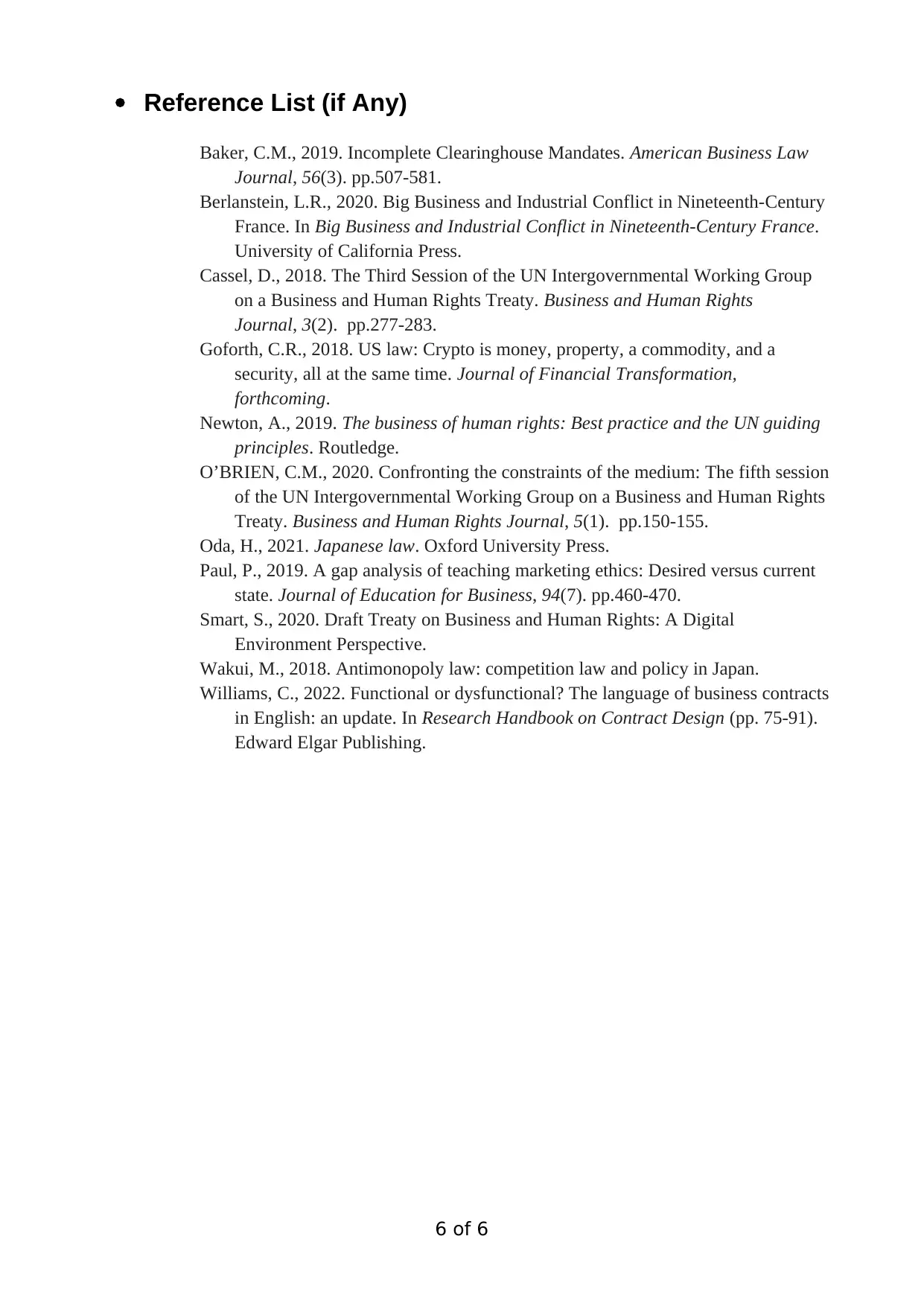
Reference List (if Any)
Baker, C.M., 2019. Incomplete Clearinghouse Mandates. American Business Law
Journal, 56(3). pp.507-581.
Berlanstein, L.R., 2020. Big Business and Industrial Conflict in Nineteenth-Century
France. In Big Business and Industrial Conflict in Nineteenth-Century France.
University of California Press.
Cassel, D., 2018. The Third Session of the UN Intergovernmental Working Group
on a Business and Human Rights Treaty. Business and Human Rights
Journal, 3(2). pp.277-283.
Goforth, C.R., 2018. US law: Crypto is money, property, a commodity, and a
security, all at the same time. Journal of Financial Transformation,
forthcoming.
Newton, A., 2019. The business of human rights: Best practice and the UN guiding
principles. Routledge.
O’BRIEN, C.M., 2020. Confronting the constraints of the medium: The fifth session
of the UN Intergovernmental Working Group on a Business and Human Rights
Treaty. Business and Human Rights Journal, 5(1). pp.150-155.
Oda, H., 2021. Japanese law. Oxford University Press.
Paul, P., 2019. A gap analysis of teaching marketing ethics: Desired versus current
state. Journal of Education for Business, 94(7). pp.460-470.
Smart, S., 2020. Draft Treaty on Business and Human Rights: A Digital
Environment Perspective.
Wakui, M., 2018. Antimonopoly law: competition law and policy in Japan.
Williams, C., 2022. Functional or dysfunctional? The language of business contracts
in English: an update. In Research Handbook on Contract Design (pp. 75-91).
Edward Elgar Publishing.
6 of 6
Baker, C.M., 2019. Incomplete Clearinghouse Mandates. American Business Law
Journal, 56(3). pp.507-581.
Berlanstein, L.R., 2020. Big Business and Industrial Conflict in Nineteenth-Century
France. In Big Business and Industrial Conflict in Nineteenth-Century France.
University of California Press.
Cassel, D., 2018. The Third Session of the UN Intergovernmental Working Group
on a Business and Human Rights Treaty. Business and Human Rights
Journal, 3(2). pp.277-283.
Goforth, C.R., 2018. US law: Crypto is money, property, a commodity, and a
security, all at the same time. Journal of Financial Transformation,
forthcoming.
Newton, A., 2019. The business of human rights: Best practice and the UN guiding
principles. Routledge.
O’BRIEN, C.M., 2020. Confronting the constraints of the medium: The fifth session
of the UN Intergovernmental Working Group on a Business and Human Rights
Treaty. Business and Human Rights Journal, 5(1). pp.150-155.
Oda, H., 2021. Japanese law. Oxford University Press.
Paul, P., 2019. A gap analysis of teaching marketing ethics: Desired versus current
state. Journal of Education for Business, 94(7). pp.460-470.
Smart, S., 2020. Draft Treaty on Business and Human Rights: A Digital
Environment Perspective.
Wakui, M., 2018. Antimonopoly law: competition law and policy in Japan.
Williams, C., 2022. Functional or dysfunctional? The language of business contracts
in English: an update. In Research Handbook on Contract Design (pp. 75-91).
Edward Elgar Publishing.
6 of 6
⊘ This is a preview!⊘
Do you want full access?
Subscribe today to unlock all pages.

Trusted by 1+ million students worldwide
1 out of 6
Related Documents
Your All-in-One AI-Powered Toolkit for Academic Success.
+13062052269
info@desklib.com
Available 24*7 on WhatsApp / Email
![[object Object]](/_next/static/media/star-bottom.7253800d.svg)
Unlock your academic potential
Copyright © 2020–2026 A2Z Services. All Rights Reserved. Developed and managed by ZUCOL.


